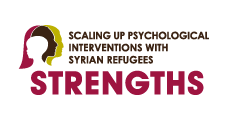Scalable psychological interventions are sometimes also called “low intensity interventions”. They are modified, evidence-based psychological treatments, such as:
- Brief, basic, paraprofessional-delivered versions of existing evidence-based psychological treatments (e.g., basic versions of cognitive-behavioural therapy, interpersonal therapy).
- Self-help materials drawing from evidence-based psychological treatment principles, in the form of: – Self-help books – Self-help audiobooks or videobooks – Online self-help programs.
- Guided self-help in the form of individual or group programs guiding clients in the use of above mentioned self-help materials.
The term “low intensity” indicates a less intense level of specialist human resource use. It means that the intervention has been modified to use much less resources compared to conventional psychological treatments by specialists. As a result, aspects about the intervention are changed to make them feasible in communities that do not have many specialists. Such modifications can thus create more accessible mental health care that reaches a larger number of people. Even when low intensity interventions are somewhat less effective than conventional models of psychological treatment, such differences may be acceptable in exchange for the increased coverage and accessibility gained in return. This compromise can be assessed using cost-effectiveness research methods from the field of health economics.



Leave A Comment